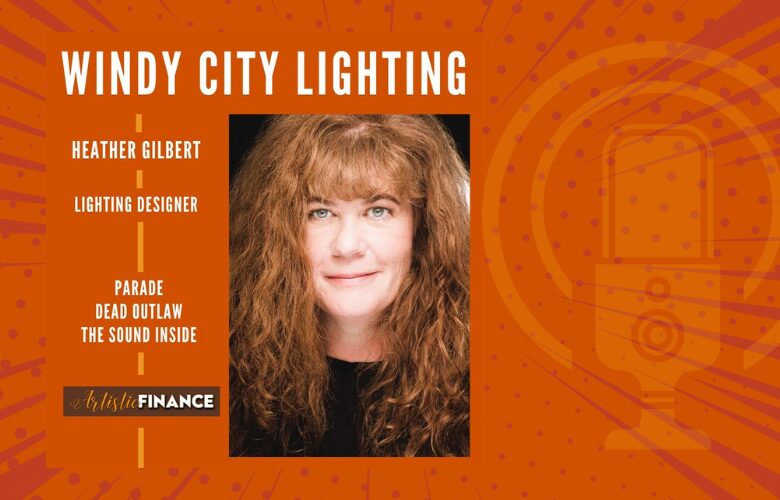Heather Gilbert: Managing a Sustainable Career as a Lighting Designer

In this Artistic Finance Podcast Episode, Ethan Steimel speaks with Heather Gilbert, an acclaimed lighting designer from Chicago who has worked on notable Broadway productions like Parade and The Sound Inside. Below is an insight into the Top 5 questions and answers in this Podcast.
What are some strategies for freelance lighting designers to negotiate and manage design fees?
Heather Gilbert shared insights into negotiating design fees, highlighting the importance of asking for more and normalizing conversations about finances. She emphasized the need to consider not just the upfront fee but also additional expenses like travel, housing, and studio needs. Heather noted that lighting designers often have to manage these aspects independently, even when working on larger productions, making it crucial to account for such costs during negotiations.Additionally, she recommended maintaining a habit of saving, leveraging apps like Acorns for micro-savings, and always budgeting with both monthly and annual expenses in mind. These practices help ensure financial stability despite the unpredictable nature of freelance work.
How does a Broadway lighting design project differ between nonprofit plays and commercial musicals in terms of fees and logistics?
Heather revealed that the fees for Broadway lighting design projects can vary significantly based on whether the production is a nonprofit play or a commercial musical. Nonprofit plays, which often have shorter runs, typically offer smaller fees compared to commercial musicals with longer engagements. For example, Heather shared her experience working on both types of projects, noting that while her work on a nonprofit play provided valuable artistic opportunities, it required more personal financial investment, such as covering her own housing and travel expenses in New York.In contrast, commercial musicals often have larger budgets, allowing for better financial support for designers, including covering travel and housing. However, both types require careful financial planning to account for the time commitment and upfront costs.
What advice do you offer about pursuing a career in theater design and navigating the industry?
Heather stressed the importance of “showing up” and building relationships with directors and other industry professionals. She encouraged aspiring designers to maintain an active presence, attend local theater events, and leverage social media to connect with peers and collaborators. Reaching out to other designers for mentorship or collaboration was another suggestion, as long as the approach is respectful and genuine.She also advised designers considering graduate school to choose programs with strong directing tracks, as directors often play a key role in hiring designers. This strategic choice helps foster long-term professional relationships that can lead to consistent work opportunities.
How do you manage financial aspects like taxes and budgeting as a freelance designer?
Heather manages her finances with a detailed budgeting system that includes monthly and annual columns to track expenses and payment schedules. She highlighted the importance of understanding quarterly taxes and using tools like the IRS2Go app to make payments efficiently.Interestingly, Heather files her own taxes using TurboTax, even as a Broadway lighting designer, which she described as a manageable process despite the complexity of freelance income. She encouraged designers to attend seminars on taxes for artists and to approach financial management with a learning mindset, acknowledging that mistakes can happen but are usually fixable.
What is your perspective on the evolving role of lighting designers and their relationship with electricians and assistants?
Heather reflected on how technology has dramatically changed the role of lighting designers and electricians. She noted that younger designers are expected to have a more technical understanding of equipment and software, which was less common when she started her career. She also discussed the stigma that used to exist around transitioning from being an electrician to a designer, emphasizing that this perception has improved over time.In terms of assistants, she explained that theaters often cover the cost of on-site assistants, but designers might need to allocate studio funds for off-site support like drafting or software expenses. She praised the collaborative efforts of electricians and assistants, underscoring their essential role in the success of any production.
Key Insights from Heather Gilbert:
- Normalize Asking for More
Heather emphasized the importance of negotiating higher fees and valuing your work, encouraging freelancers to advocate for fair compensation in every project. - DIY Taxes Are Doable
Heather files her own taxes using TurboTax, teaching students that understanding and managing taxes is within reach, even for freelancers. - Importance of Networking
She highlighted the value of forming relationships with directors and peers, often suggesting designers reach out via social media to build connections. - Tech Knowledge is Crucial
Heather noted the growing need for lighting designers to understand modern technologies, like LEDs and software, to stay competitive. - Strategic Project Choices
Heather shared that she sometimes takes financially challenging projects, like nonprofit shows, for artistic growth and long-term career benefits.
Listen to this Episode on:
Website / Spotify / Apple Podcasts / YouTube
Back to Home
Editor's Note: At StageLync, an international platform for the performing arts, we celebrate the diversity of our writers' backgrounds. We recognize and support their choice to use either American or British English in their articles, respecting their individual preferences and origins. This policy allows us to embrace a wide range of linguistic expressions, enriching our content and reflecting the global nature of our community.
🎧 Join us on the StageLync Podcast for inspiring stories from the world of performing arts! Tune in to hear from the creative minds who bring magic to life, both onstage and behind the scenes. 🎙️ 👉 Listen now!
